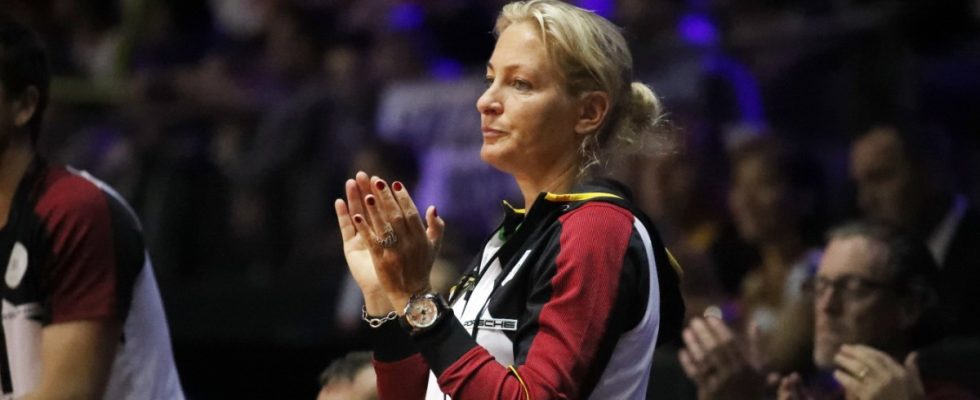You can learn from even the most painful defeats. Barbara Rittner had therefore given the young tennis player Ella Seidel, who was clearly defeated by defending champion Aryna Sabalenka at the start of the Australian Open in January, a special task. While still in Melbourne, the then 18-year-old debutante was supposed to draw a written conclusion from her first Grand Slam tournament, write down what she liked, what she didn’t like, and what needed to be improved. In her experience, this is a good basis for analyzes and discussions, said Rittner: “If you write it down, it sorts itself out.”
It was probably one of the last pieces of advice that Barbara Rittner gave in her role as national tennis coach. At the weekend, the 50-year-old unexpectedly left the German Tennis Association (DTB) after 19 years.
In the statement that the DTB sent out on Sunday morning, there was talk of an amicable separation. What was astonishing, however, was the abruptness with which the termination of such a long, almost two-decade employment relationship with a national coach who became known far beyond the white lines of tennis. When asked on Monday, the DTB announced that the contract with Rittner had officially expired at the end of 2023. “Due to ongoing discussions with the newly elected DTB executive board,” it is said, it was agreed “to extend the cooperation initially for the Australia Open and the ITF tournament in Altenkirchen, which ended on February 18th.” So it was over on Sunday. All in all, an unusual time, shortly after the start of the tennis season.
To date, Rittner has not been available “exclusively” to the DTB
The reason for the separation was the “different ideas about future cooperation”. And there are some indications that there were fundamental differences in the discussions in this regard: Veronika Rücker, the former CEO of the German Olympic Sports Confederation (DOSB), has been responsible for youth and elite sports in the Tennis Association since 2022. And a new competitive sports concept is currently being developed in the DTB. “As part of the concept,” the DTB announced on Monday, “the role of the head national coach will also be sharpened.”
In the future, they will have a higher-level role to strengthen the “relationship between athletes and the respective home trainers” and be available “as advisors and mentors”. “It is important for the DTB,” it continues, “that the head national coaches are fully and exclusively available to the association and take care of the entire range of young talent and elite sports, from the youngest talent to the top players. especially when it comes to strategic considerations.”
Barbara Rittner was instrumental in promoting a new, silver generation around Angelique Kerber (2nd from right) – when German tennis was on the rocks.
(Photo: Bernd Weissbrod/dpa)
It is not difficult to discover a possible contradiction to Barbara Rittner’s previous work in this catalog of requirements. Because until now, it was provided with a fee contract by the association and was not “exclusively” available to the DTB. She has also appeared as a TV expert on Eurosport’s tennis broadcasts for years. She also acts as tournament director in Berlin for the world-class grass tournament there. She will continue to carry out both functions after her national coaching position ends.
The decision to leave the association was “not easy” for her, Rittner is quoted as saying in the association’s statement on Sunday. But she now sees the “right time for a change” has come. Beyond that, she said, she doesn’t want to comment for the time being.
Rittner, a former world-class player, had swung the racket for the DTB as a junior. She later belonged to the golden tennis generation around Steffi Graf and Anke Huber, who triumphed in the Federations Cup in 1992. The Federations Cup was renamed the Fed Cup, then the Billie Jean King Cup – the names changed, Rittner stayed. In 2005, after ending her professional career, she became head of the team and national coach in 2009. In these roles, she played a key role in promoting a new, silver generation around Angelique Kerber, at a time when German tennis was in decline. Angelique Kerber became a three-time Grand Slam winner; Andrea Petkovic and Julia Görges reached the top ten; Sabine Lisicki reached the Wimbledon semi-finals, Anna-Lena Grönefeld became one of the best doubles specialists.
Rittner wrote on WhatsApp on Sunday that they deserve “special thanks” – “as well as the young players who have great potential for the future”. Professionals like Ella Seidel, who lost early in Melbourne. What happens next for these players? Upon request, the DTB announced that they would create “an interim solution with our well-positioned national coaching team in the DTB.”

